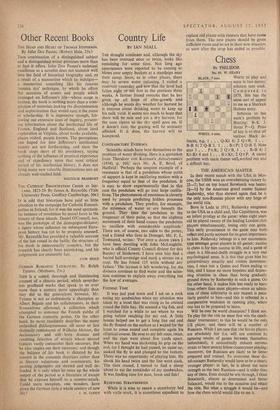Chess
BY PHILIDOR
No. 10. W. GEARY
Solution to last week's problem by fences, e.g. 1 . . . Q-Kt 6; 2 Q x R. 1 . . . B-R 6; 2 Q-B 3. 1 . . . B x P; 2 Q-R 5. Note
also 1 . . . Px R; 2 Q x B, 1 . . . R-B 4; 2 Kt-Kt 4 and 1 . . . R x Kt; 2 Q x P. A varied problem with main theme well worked out and a difficult key.
THE AMERICAN MASTER
In their recent match with the USA in Mos- cow, the USSR won an overwhelming victory by 25-7; but on top board Botwinnik was beaten 21/—li by the American grand master Samuel Reshevsky, who thus showed again that he is the only non-Russian player with any hone of the world title.
Born in Lodz in 1911, Reshevsky emigrated to the USA as a child and, like Capablanca, was an infant prodigy at the game: when eight years old he played twenty of the leading London club players simultaneously, losing only one game. This early prominence in the game may both reflect and partly account for its great importance to him. Reshevsky belongs to a not uncommon type amongst great players in all games: success in chess is for him success in life, and a game of chess is a life-and-death struggle in a very real psychological sense. It is this that gives him his extraordinary tenacity and tireless determina- tion. 1 once lost a Queen and Pawn ending to him, and 1 know no more hopeless and depres- sing situation in chess than being gradually ground down by Reshevsky in such a game. On the other hand, it makes him less ready to learn from others than most players—since an admis- sion of chess inferiority in any respect is pecu- liarly painful to him—and this is reflected in a comparative weakness in opening play, where one has to be prepared to learn.
Will he ever be world champion? I think not. To play for the title he must first win the candi- dates' tournament; in this he would be the only US player, and there will be a number of Russians. While I am sure that the Soviet players are absolutely fair (i.e. will not combine by agreeing results of games between themselves beforehand), it undoubtedly reduces nervous strain to have several fellow countrymen playing: moreover, the Russians are likely to be better prepared and trained. To overcome these dis- advantages Reshevsky would have to be a clearly stronger player: in fact, he is about the same strength as the best Russians—and is older than any of them. Even should he win through, I think Botwinnik, almost as determined and better balanced, would rise to the occasion and retain the title. But what a struggle it would be—and how the chess world would like to see it.
WHITE, 6 men.


































 Previous page
Previous page